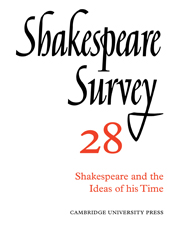Book contents
- Frontmatter
- ‘Richard II’ and the Realities of Power
- The Politics of Corruption in Shakespeare’s England
- Literature without Philosophy: ‘Antony and Cleopatra’
- Self-consciousness in Montaigne and Shakespeare
- ‘Measure for Measure’: The Bed-trick
- Shakespeare and the Doctrine of the Unity of Time
- ‘Coriolanus’ and the Body Politic
- ‘Titus Andronicus’, iii, i, 298–9
- ‘The Merchant of Venice’ and the Pattern of Romantic Comedy
- The Integrity of ‘Measure for Measure’
- ‘To Say One’: An Essay on ‘Hamlet’
- ‘The Tempest’ and King James’s ‘Daemonologie’
- Sight-lines in a Conjectural Reconstruction of an Elizabethan Playhouse
- The Smallest Season: The Royal Shakespeare Company at Stratford in 1974
- The Year's Contributions to Shakespearian Study 1 Critical Studies
- 2 Shakespeare’s Life, Times, and Stage
- 3 Textual Studies
- Index
- Plate section
3 - Textual Studies
Published online by Cambridge University Press: 28 March 2007
- Frontmatter
- ‘Richard II’ and the Realities of Power
- The Politics of Corruption in Shakespeare’s England
- Literature without Philosophy: ‘Antony and Cleopatra’
- Self-consciousness in Montaigne and Shakespeare
- ‘Measure for Measure’: The Bed-trick
- Shakespeare and the Doctrine of the Unity of Time
- ‘Coriolanus’ and the Body Politic
- ‘Titus Andronicus’, iii, i, 298–9
- ‘The Merchant of Venice’ and the Pattern of Romantic Comedy
- The Integrity of ‘Measure for Measure’
- ‘To Say One’: An Essay on ‘Hamlet’
- ‘The Tempest’ and King James’s ‘Daemonologie’
- Sight-lines in a Conjectural Reconstruction of an Elizabethan Playhouse
- The Smallest Season: The Royal Shakespeare Company at Stratford in 1974
- The Year's Contributions to Shakespearian Study 1 Critical Studies
- 2 Shakespeare’s Life, Times, and Stage
- 3 Textual Studies
- Index
- Plate section
Summary
Publication of the American Riverside Shakespeare, whose text has been edited throughout from the early editions by G. Blakemore Evans, has been long awaited with keen interest, nor are expectations disappointed by the handsome and substantial book which has now appeared. Never before can a single-volume edition of Shakespeare have managed to combine so reliably edited a text presented in such a readable form with so rich a digest of ancillary and explanatory materials. John Heminge and Henry Condell addressed themselves and the First Folio of 1623 to ‘the great Variety of Readers’, a phrase which the publishers of this new Shakespeare translate as covering ‘in the plainer language of today . . . the general reader, the student, and the scholar’. The general reader may find more grounds for speculation about the plan of the volume than others with a professional interest in the subject. He will find obvious sense in the chronological grouping of the plays and distinct convenience in the placing of the brief but helpful commentary unobtrusively at the foot of each page of text. In the text itself, he may wonder why words sometimes appear in a spelling which departs from modern usage and why square brackets enclose not only many stage directions but words, phrases or more extended passages in the speeches themselves. He may reflect that the textual notes, although decently postponed to the end of each text, occupy enough space to suggest comprehensiveness, and it may occur to him to question the relative prominence given to the general textual introduction (which precedes the works) and the stage history (which follows them).
- Type
- Chapter
- Information
- Shakespeare Survey , pp. 173 - 182Publisher: Cambridge University PressPrint publication year: 1975



